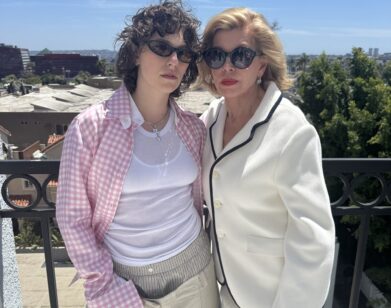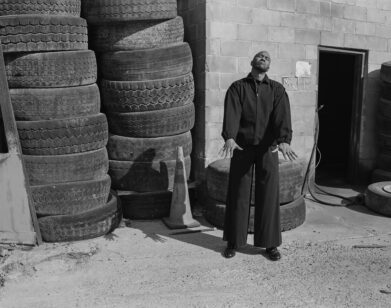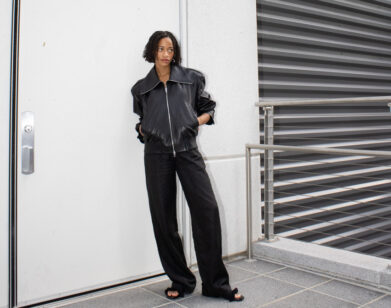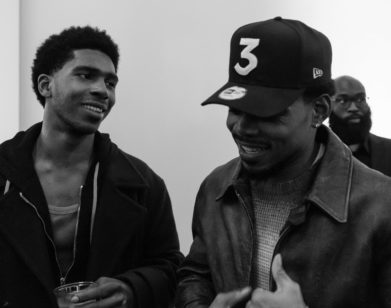Artist Rashid Johnson Isn’t the Plant-Parenting Type
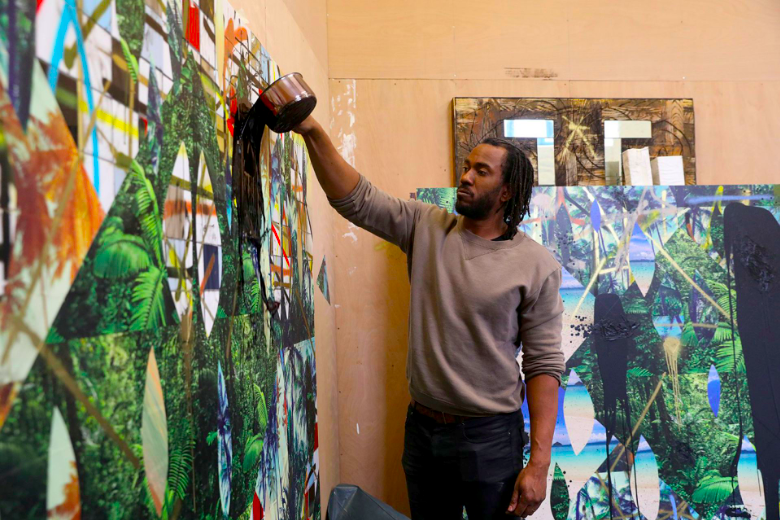
Photos Courtesy Rashid Johnson.
Rashid Johnson, the conceptual artist whose latest exhibition The Hikers opened at Hauser & Wirth this week, isn’t afraid to get his hands dirty. Through elaborately constructed-then-destroyed objects smeared with paint and broken glass, painstaking collage, and verdant sculpture; Johnson probes the tenderest nooks of the human psyche through a disarming mix of humor, vulnerability, and confusion.
A walk through Johnson’s exhibition elicits every reaction; His “Broken Men,” an amalgamation of the domestic surfaces we take for granted, are as heartwarming as they are arresting. The “Escape Collages,” like visual representations of the mind, project a blaring combination of urgent desires and hazy memories. “Untitled Bronze Head” soothes even as it spooks; a giant bronze skull consumed from the inside by roots and leaves.
It’s daunting to think that, for Johnson, this is what mankind’s frenzied time on earth amounts to: a patchwork of collective anxieties, isolated moments, and imagined escapes that culminate in succulents growing out of our eye sockets. But a walk through the gallery with Johnson illuminates the honesty and optimism at the heart of the artist’s work.
———
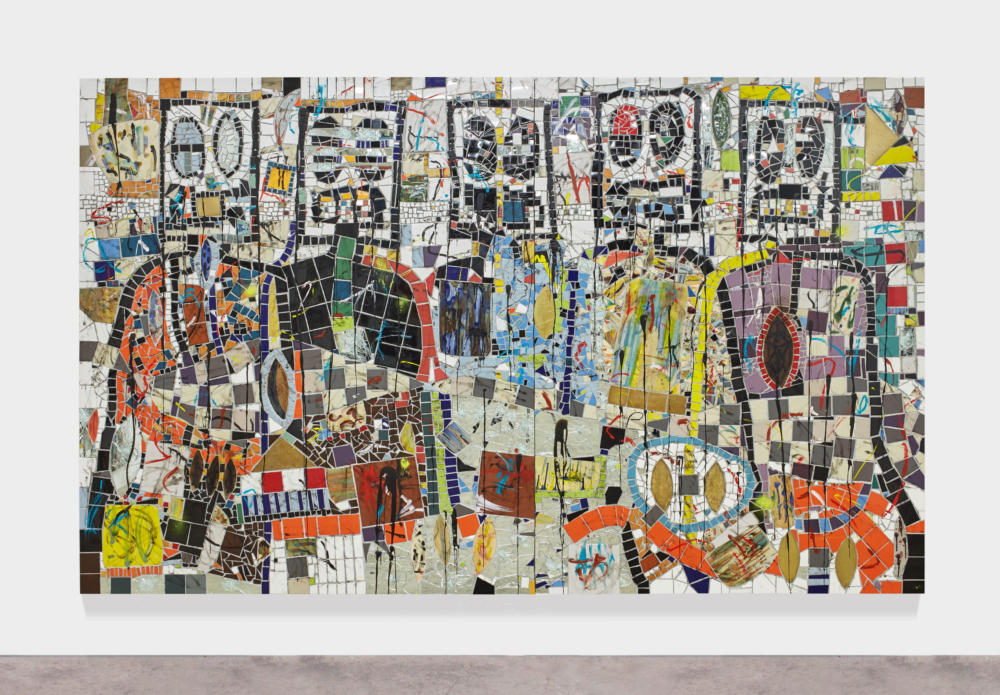
“The Broken Five” © Rashid Johnson.
RASHID JOHNSON: I want to talk about this painting. It’s called “The Broken Five,” and it comes from a prior body work called “Anxious Men.” The “Anxious Men” were really reflections on my own anxiety, and a lot of what I believe to be a collective anxiety. They’ve evolved into these mosaic works, which I’m calling “Broken Men.” There’s this feeling that you could almost scrape off the materials that built up to make them— black soap and wax. You have what I’m considering to be five characters, standing next to each other, and all of them wearing long draping textiles. These expanding lines and patterns are made up of tile, bronze, mirror that’s been broken, wood that’s been branded, as well as quite a few ceramic pieces that I’ve made myself, and in that sense it became almost a collision of sorts.
MARA VEITCH: It’s heartening to see somebody, particularly a man, explore anxiety in a public way. What do you see as the value or risk of doing that?
JOHNSON: The value is an opportunity to create a cathartic space for myself, and to admit something about my own experience—where my fears lie and where my strengths lie. It’s an interesting thing you point out: Men often struggle to admit their shortcomings, or what they may imagine to be their shortcomings. I spend a lot of time trying to explore that space. I think that the vulnerability that I show makes my work stronger. Ideally, it provides the viewer some agency to express similar emotions.
VEITCH: What is the relationship between deliberate construction and improvisation for you?
JOHNSON: I think about most things that I make as quite topographic. So you imagine a landscape, the different materials in it, then just begin to translate them. Making a painting using a thousand different cuts brings that paint to life. Inside of this exists maybe 300 abstract micro-paintings. And then stepping back, just one large macro. There’s also some aspects that were not quite deliberate. So in a sense, it’s like anything else a human being would make.
VEITCH: It’s funny that you say that anyone would make this. As I look at it I’m kind of jealous… because most people can’t just mess something up. Everyone wants to, but only you can.
JOHNSON: [Laughs.] Yeah. There’s a fearlessness in making these things. You have to really commit in a way that’s fierce and engaging.
———
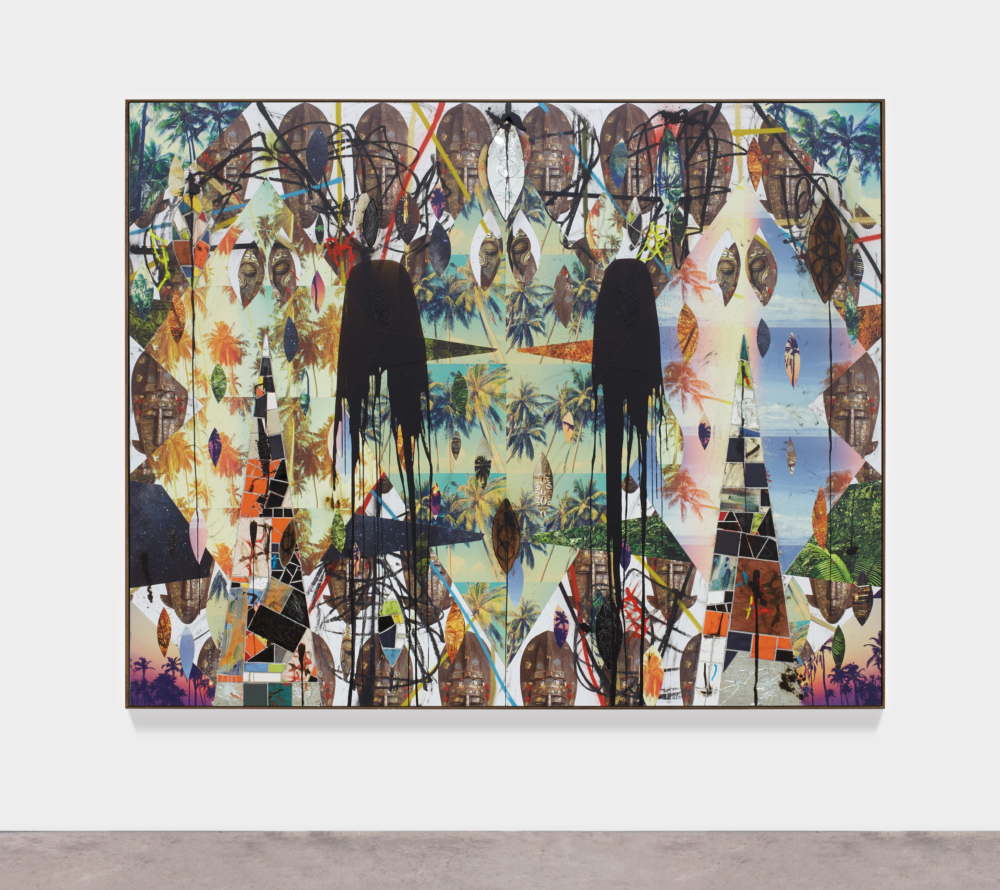
“Untitled Escape Collage” © Rashid Johnson.
JOHNSON: This is one of my “Escape Collages.” They’re made using several photographs, some of which I’ve made myself, some of which are borrowed. There’s an African mask in the background, covered in cowrie shells. As a Western artist exploring Western themes, I’m thinking about the outreach of modernism and cultural appropriation; themes of African-ness and its relationship to the Western principles in which I was trained. This work connects all of those ideas, in some respect. I use black soap and wax to help hold down the surface.
VEITCH: Your eyes never rest looking at this. There’s always something new standing out.
JOHNSON: Yeah. In some sense they’re very sculptural, but they’re built on flat planes as what I guess most people would consider to be painting.
VEITCH: You use some of these materials—black soap, wax, tile—across several bodies of work. Do they function as signifiers of something specific?
JOHNSON: In some ways they’re evolving, but the way that I came to black soap was quite deliberate. It was a material that existed in my home. My mother was an African history professor. We traveled and lived in West Africa for a period of time. Black soap is for people who have sensitive skin. So this relationship to sensitivity is really present in the work. I employed it as a signifier, as a healing substance. I also like the idea that you can wash yourself with the painting. It has some utility outside of being an art object.
VEITCH: There’s so much to see. They feel like a glimpse of a really poorly-treated bathroom. There’s something touching about seeing such a hard-working surface in a gallery.
JOHNSON: That’s right. The domestic spaces and materials that we have such familiarity with—like tile or soap—when they’re elevated in the form of this work, brought to this place, they’ve finally graduated into the most sophisticated of spheres. These works are entirely built around aspiration, in a sense. I grew up in the Midwest, so something like this felt unattainable. [Gestures to palm tree images.] Like, how do I get there? What does it look like? Is it all that I expected? It’s the idea of escape.
———
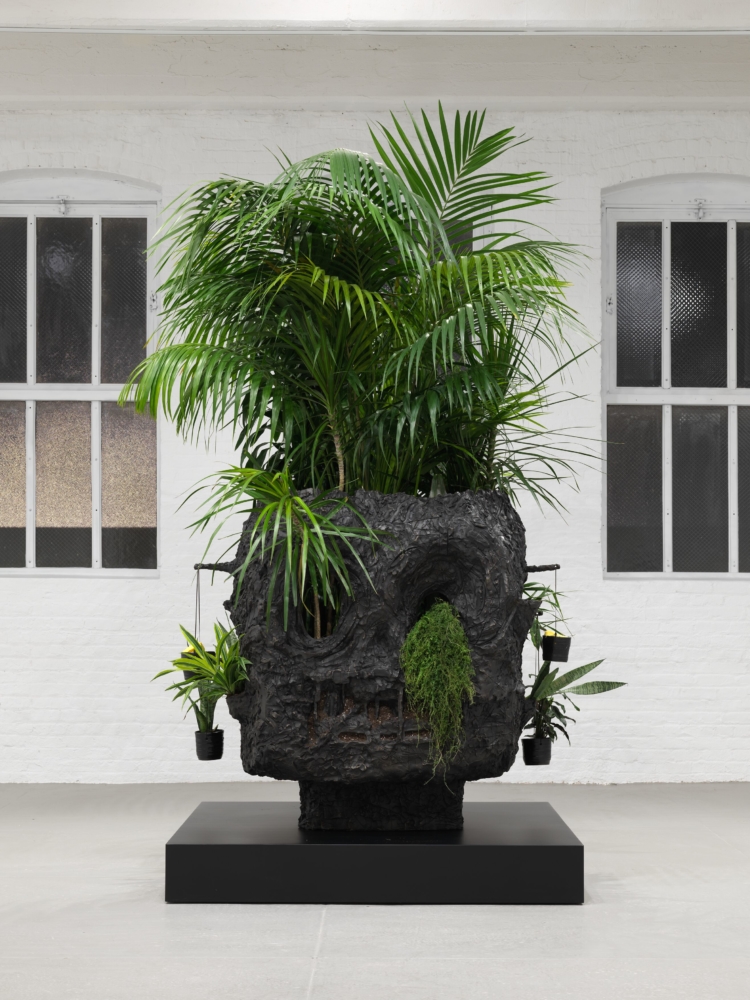
“Untitled Bronze Head” © Rashid Johnson.
JOHNSON: This is made of bronze. There’s something interesting for me about the man-made object that houses the organic object and that kind of connectivity that they share. One kind of helping the other while the other tries to overcome the first. Plants will always burst through and take over. Nature has a way of claiming things that are foreign to it. We all have to think about how these things are going to survive. I want to put one in my yard.
VEITCH: You’ve got to. How do you feel about the fact that plant parenting is the new millennial pastime?
JOHNSON: That’s fascinating. Actually, as often as I’ve used plants in my work, I’ve never considered myself to be a plant parent. But that may be because I actually have a child…
VEITCH: Yeah. You’ve met your parenting quota.
JOHNSON: Maybe I’m good on the parenting front.
VEITCH: There’s something so relaxing about seeing plants inside, but there’s also something dreadful about they way they’re taking over this skull.
JOHNSON: You think so? I think nature knows no boundaries.
VEITCH: That’s what’s scary. They’ll win in the end.
JOHNSON: [Laughs.] They’ll definitely win.

